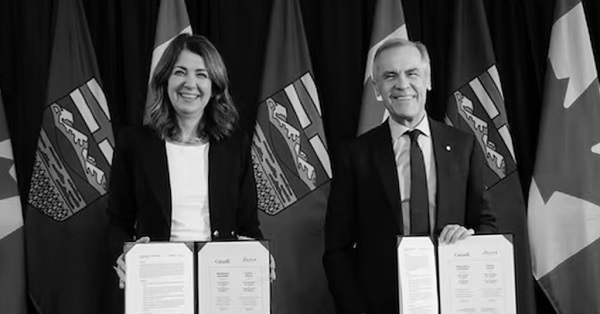Energy
DO OR DO NOT: Canada is Missing in Action – Jeff Lawson of Cenovus Energy

From Energy Now
By Jeff Lawson
After touring Cenovus operations in China and Indonesia, Jeff Lawson reflects on Asia’s energy reality and what it means for Canada.
My recent trip to our operations in China and Indonesia was an incredibly valuable chance to see world energy trends up close.
Witnessing the dynamism and ambition of our teams in those countries was inspiring, and I am grateful to our kind hosts. But I couldn’t escape the stark contrast with the situation at home.
I should have returned feeling optimistic, but instead I came back feeling down. At the end of the day, seeing what other places in the world are doing only highlights one difficult truth: As an economic force, Canada is missing in action.
What most enriched my visit was meeting our own people. In China, our teams are incredibly happy working in the energy industry. They are motivated, because they see the purpose in their work every day, delivering the foundational products that lift communities out of poverty.
That same clarity of purpose is evident in the market itself.
In Indonesia our local production is fully consumed in-country. Overall, they face declining natural gas reserves, and with a growing population the need for imports is critical. There is a desire for Canadian supply. We just need to get it there.
From a global perspective, the LNG we are now finally shipping is still a drop in the bucket. For Canada, however, it represents a massive and vital step forward.
Meeting Asia’s demand for natural gas can become an even greater opportunity if we choose.
Thinking about natural gas demand throughout the world, we receive $12/Mcf for our natural gas in China. We only receive $1-2/Mcf in Canada (pundits will say that is optimistic), even though we have abundant Canadian supply. Our limitations are infrastructure and offtake facilities.
It’s a competitive world. Markets around the world desire what we provide, whether that’s oil and gas, minerals, or agriculture.
Yet, here at home, some people seem unable to grasp this.
The Trans Mountain Expansion Project took a decade and more than $35 billion to build.
We still face a host of policies that box our energy industry in. It’s the Emissions Cap that creates fundamental uncertainty. It’s the North Coast tanker ban that limits our market reach. It’s the cumulative weight of policies like the methane regulations and industrial carbon tax that makes it nearly impossible to allocate capital with confidence.
And the world now sees Canada as a difficult and unpredictable place to do business. Investor capital is mobile, and it will flow to jurisdictions that provide clarity and predictability.
There are fewer burdens and lower costs involved in moving our product south to the United States, and the U.S. is a key consumer of our energy products. But while that path is easier, and existing pipelines can be expanded, it is not a long-term strategy for national strength if egress remains constrained.
Over-reliance on a single customer leaves us vulnerable, as we have learned within the last year. If Canada wants to become stronger and truly diversify for the long-run, we have to drive to tidewater.
Recent messages from political leaders have been correct, but the action hasn’t yet followed.
This isn’t about slowly moving impediments out of the way; this is about deeper, more effective change that enables us to compete, backed by genuine federal-provincial alignment.
How we decide to compete with the rest of the world, or not, is up to us. As the saying goes, “Do or do not, there is no try.” Saying we’re trying is not getting us there.
Jeff Lawson is Executive Vice-President, Corporate Development & Chief Sustainability Officer at Cenovus Energy.
Energy
Unceded is uncertain

Tsawwassen Speaker Squiqel Tony Jacobs arrives for a legislative sitting. THE CANADIAN PRESS/Darryl Dyck
From Resource Works
Cowichan case underscores case for fast-tracking treaties
If there are any doubts over the question of which route is best for settling aboriginal title and reconciliation – the courts or treaty negotiations – a new economic snapshot on the Tsawwassen First Nation should put the question to rest.
Thanks to a modern day treaty, implemented in 2009, the Tsawwassen have leveraged land, cash and self-governance to parlay millions into hundreds of millions a year, according to a new report by Deloitte on behalf of the BC Treaty Commission.
With just 532 citizens, the Tsawwassen First Nation now provides $485 million in annual employment and 11,000 permanent retail and warehouse jobs, the report states.
Deloitte estimates modern treaties will provide $1 billion to $2 billion in economic benefits over the next decade.
“What happens, when you transfer millions to First Nations, it turns into billions, and it turns into billions for everyone,” Sashia Leung, director of international relations and communication for the BC Treaty Commission, said at the Indigenous Partnership Success Showcase on November 13.
“Tsawwassen alone, after 16 years of implementing their modern treaty, are one of the biggest employers in the region.”

BC Treaty Commission’s Sashia Leung speaks at the Indigenous Partnerships Success Showcase 2025.
Nisga’a success highlights economic potential
The Nisga’a is another good case study. The Nisga’a were the first indigenous group in B.C. to sign a modern treaty.
Having land and self-governance powers gave the Nisga’a the base for economic development, which now includes a $22 billion LNG and natural gas pipeline project – Ksi Lisims LNG and the Prince Rupert Gas Transmission line.
“This is what reconciliation looks like: a modern Treaty Nation once on the sidelines of our economy, now leading a project that will help write the next chapter of a stronger, more resilient Canada,” Nisga’a Nation president Eva Clayton noted last year, when the project received regulatory approval.
While the modern treaty making process has moved at what seems a glacial pace since it was established in the mid-1990s, there are some signs of gathering momentum.
This year alone, three First Nations signed final treaty settlement agreements: Kitselas, Kitsumkalum and K’omoks.
“That’s the first time that we’ve ever seen, in the treaty negotiation process, that three treaties have been initialed in one year and then ratified by their communities,” Treaty Commissioner Celeste Haldane told me.
Courts versus negotiation
When it comes to settling the question of who owns the land in B.C. — the Crown or First Nations — there is no one-size-fits-all pathway.
Some First Nations have chosen the courts. To date, only one has succeeded in gaining legal recognition of aboriginal title through the courts — the Tsilhqot’in.
The recent Cowichan decision, in which a lower court recognized aboriginal title to a parcel of land in Richmond, is by no means a final one.
That decision opened a can of worms that now has private land owners worried that their properties could fall under aboriginal title. The court ruling is being appealed and will almost certainly end up having to go to the Supreme Court.
This issue could, and should, be resolved through treaty negotiations, not the courts.
The Cowichan, after all, are in the Hul’qumi’num treaty group, which is at stage 5 of a six-stage process in the BC Treaty process. So why are they still resorting to the courts to settle title issues?
The Cowichan title case is the very sort of legal dispute that the B.C. and federal governments were trying to avoid when it set up the BC Treaty process in the mid-1990s.
Accelerating the process
Unfortunately, modern treaty making has been agonizingly slow.
To date, there are only seven modern implemented treaties to show for three decades of works — eight if you count the Nisga’a treaty, which predated the BC Treaty process.
Modern treaty nations include the Nisga’a, Tsawwassen, Tla’amin and five tribal groups in the Maa-nulth confederation on Vancouver Island.
It takes an average of 10 years to negotiate a final treaty settlement. Getting a court ruling on aboriginal title can take just as long and really only settles one question: Who owns the land?
The B.C. government has been trying to address rights and title through other avenues, including incremental agreements and a tripartite reconciliation process within the BC Treaty process.
It was this latter tripartite process that led to the Haida agreement, which recognized Haida title over Haida Gwaii earlier this year.
These shortcuts chip away at issues of aboriginal rights and title, self-governance, resource ownership and taxation and revenue generation.
Modern treaties are more comprehensive, settling everything from who owns the land and who gets the tax revenue from it, to how much salmon a nation is entitled to annually.
Once modern treaties are in place, it gives First Nations a base from which to build their own economies.
The Tsawwassen First Nation is one of the more notable case studies for the economic and social benefits that accrue, not just to the nation, but to the local economy in general.
The Tsawwassen have used the cash, land and taxation powers granted to them under treaty to create thousands of new jobs. This has been done through the development of industrial, commercial and residential lands.
This includes the development of Tsawwassen Mills and Tsawwassen Commons, an Amazon warehouse, a container inspection centre, and a new sewer treatment plant in support of a major residential development.
“They have provided over 5,000 lease homes for Delta, for Vancouver,” Leung noted. “They have a vision to continue to build that out to 10,000 to 12,000.”
Removing barriers to agreement
For First Nations, some of the reticence in negotiating a treaty in the past was the cost and the loss of tax exemptions. But those sticking points have been removed in recent years.
First Nations in treaty negotiations were originally required to borrow money from the federal government to participate, and then that loan amount was deducted from whatever final cash settlement was agreed to.
That requirement was eliminated in 2019, and there has been loan forgiveness to those nations that concluded treaties.
Another sticking point was the loss of tax exemptions. Under Section 87 of Indian Act, sales and property taxes do not apply on reserve lands.
But under modern treaties, the Indian Act ceases to apply, and reserve lands are transferred to title lands. This meant giving up tax exemptions to get treaty settlements.
That too has been amended, and carve-outs are now allowed in which the tax exemptions can continue on those reserve lands that get transferred to title lands.
“Now, it’s up to the First Nation to determine when and if they want to phase out Section 87 protections,” Haldane said.
Haldane said she believes these recent changes may account for the recent progress it has seen at the negotiation table.
“That’s why you’re seeing K’omoks, Kitselas, Kitsumkalum – three treaties being ratified in one year,” she said. “It’s unprecedented.”
The Mark Carney government has been on a fast-tracking kick lately. But we want to avoid the kind of uncertainty that the Cowichan case raises, and if the Carney government is looking for more things to fast-track that would benefit First Nations and the Canadian economy, perhaps treaty making should be one of them.
Resource Works News
Alberta
This new Canada–Alberta pipeline agreement will cost you more than you think


Canada and Alberta’s new net-zero energy deal is being promoted as progress, but it also brings rising costs. In this video, I break down the increase to Alberta’s industrial carbon price, how those costs can raise fuel, heating, and grocery prices, and why taxpayer-funded carbon-capture projects and potential pipeline delays could add even more. Here’s what this agreement could mean for Canadians.
Watch Nataliya Bankert’s latest video.
-

 Bruce Dowbiggin2 days ago
Bruce Dowbiggin2 days agoSometimes An Ingrate Nation Pt. 2: The Great One Makes His Choice
-

 Business18 hours ago
Business18 hours agoRecent price declines don’t solve Toronto’s housing affordability crisis
-

 National2 days ago
National2 days agoMedia bound to pay the price for selling their freedom to (selectively) offend
-

 Daily Caller17 hours ago
Daily Caller17 hours agoTech Mogul Gives $6 Billion To 25 Million Kids To Boost Trump Investment Accounts
-

 C2C Journal2 days ago
C2C Journal2 days agoLearning the Truth about “Children’s Graves” and Residential Schools is More Important than Ever
-

 Business2 days ago
Business2 days agoWhy Isn’t There a Cure for Alzheimer’s Disease?
-

 armed forces1 day ago
armed forces1 day agoGlobal Military Industrial Complex Has Never Had It So Good, New Report Finds
-

 Alberta2 days ago
Alberta2 days agoNew era of police accountability









